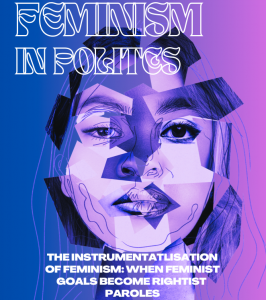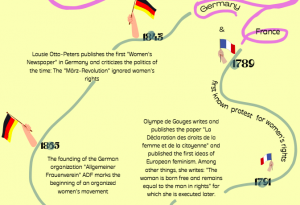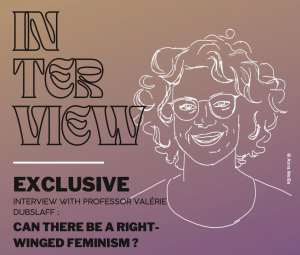
Nika Shakarami, Hadis Najafi and Sarina Esmailzadeh are three Iranian women lately portrayed by the German Auswertige Amt. The three young women between 16 and 22 years old were Iranian feminists who were beaten or shot to death during protests in 2022. Their fates are just three examples that stand for several hundred other demonstrators of different genders who were killed during protests against the Mullah regime. What they all have in common is that they call themselves feminists, a characterization that can be found in many contexts. What does this term mean and what is behind it that people are even killed for it today?
Feminism is clearly a term that is on everyone’s lips today, and is used to describe political movements and goals, individual activists, and political figures and finally even concepts of companies, institutions or public bodies.
The term is used in articles, pamphlets, speeches and even movies while often marginalizing its holistic meaning in various ways. Feminism, for example, is neither a purely Western concept nor one that addresses only one gender or has only emerged in recent years. On the contrary, in many parts of the world feminism means a life and death struggle for many people, becoming clearly visible by just one glance at Iran.
Finding a clear definition of feminism is not easy. Nevertheless, it is possible to clearly characterize the principles of feminism, which are summarized, for example, in the Encyclopædia Britannica as follows:
Feminism (is) the belief in social, economic, and political equality of the sexes.
Above all this doesn’t mean to favor the female gender or even to devalue another, in this case the male gender, which is often wrongly interpreted. On the contrary, at its core it is about creating equality between all genders and accordingly all people, which is not the case until today. Feminists or feministic concepts though fight for rights, spaces, and opportunities for women, of which they are confided from and are dominated by male. Yet feminism has provided women several rights such as the right to vote, increased possibilities in education, the right to decide about their own body or financial independency in many countries, women are still oppressed on a daily basis, systematically disadvantaged and ultimately treated unequally to men. All around the world, all genders, including women and men, are fighting to ensure that women have no disadvantages in the world simply because of their sex. However, this fight is very difficult because this type of discrimination is deeply rooted in the social system of modernity, capitalism and finally every individual´s mindset while not being immediately visible.
Feminism remains an intergenerational goal that aims at equality, and never contains exclusion, devaluation, or distinction between disadvantaged groups of women (concerning biological sex, religion, skin color…)

Women. A picture that does not necessarily come up when one thinks of right-wing populists or even extreme right-wing radicals. Red-faced white men, mostly old, is the typical picture and proves an introverted irony because meanwhile in Germany, every fifth neo-nazi is a female. Woman are becoming increasingly important in the right-wing political spectrum and often enough radicalize themselves, for one reason in particular: they are being overlooked.
But what happens when women in right-wing populist or extreme right-wing movements advocate for supposedly feminist purpose?
Can there be a right-winged feminism?
Why do right-wing populist parties like German AfD and French Rassemblement National put woman at their head and at the same time express anti-feminist and national images of women? What is the role of woman in right-wing political spectrum?

Interview with Valérie Dubslaff: Can there be a right winged feminism?
Valérie Dubslaff is an associate professor in 20th-21st century German history at the University of Rennes 2. Her research focuses on women’s and gender history and the history of the extreme right after 1945 in Germany and Europe. She also focuses a lot on women in extreme right parties, such as the NPD in Germany – but also in populist parties, such as the AfD and the RN from a Franco-German point of view.
Why do women play such an important role in right-wing extremist parties?
Since Marine Le Pen became head of the RN, women in France have been voting for the RN. Only with these additional votes it became possible for the party to achieve their high results. In Germany, the NPD is very male-dominated, women have almost nothing to say – one reason why the party is struggling to survive.
In the AfD, on the other hand, there are more women than there used to be in the extreme right. The one who is talked about the most is Alice Weidel. She is part of the fraction leadership and has great influence on the election in Germany. You can say quite clearly that men are less able to mobilize women than women are for sure.
But doesn’t this contradict the interests of the right winged parties?
The dilemma of these parties is that they don’t want their image to be too feminized. They’re parties primarily aiming at men and have a very masculine political culture, and there’s a kind of great discrepancy that these parties have to make to speak to both men and women. Which is why we often have far right women who have a very masculinist discourse because they have to speak to everyone – that’s the fundamental problem within these parties.
Does the mother figure have an impact on voting?
Motherhood plays with mother stereotypes. Let´s have a look at Marine Le Pen, she puts her daughters first, she also puts her cats first, but she also highlights the fact that she’s a divorced woman, for example.
She shows that she’s a modern woman, a woman who can manage work and family very well. She’s a woman, but she’s also a politician she plays with stereotypes.
In the end its the key to her success: These stereotypes are expected of her which leads to another dilemma for women politicians. Politics is a male domain, it has been historically thought out and constructed without women which leads to the fact that women always have to justify themselves when they enter politics by for example saying that « I’m a mother, I’ve had so many children so I’ve fulfilled my mission as a woman, as a mother, so now I can go into politics”
Alice Weidel is a leading figure in the AfD but she’s also in a relationship with a woman of Sri Lankan origin, has children with her and lives in Switzerland. It’s an absolute paradox, isn’t it?
I don’t understand how she can look at herself in the mirror, because she’s fighting against her own interests as a woman, as a lesbian, as a mother. It’s a total contradiction, but on the other hand, she doesn’t seem to be having too bad a time of it. I don’t know, but what’s interesting is to see how she’s instrumentalized by the party. Because in 2017 there was a debate in Germany about gay marriage and it was Alice Weidel who, with her picture on the AfD posters, led a campaign against gay marriage, a sort of « manifesto for all » that also existed in Germany.
That was the justification for many to say: “she’s a lesbian and if she says she’s against marriage it’s not homophobic to say it because she’s a lesbian.” So, she’s been completely instrumentalized and apparently that seemed to suit her. It’s a cover-up for homophobia. It’s a contradiction and I don’t know how she feels about it personally, because it must be a bit hard I imagine.
Can there be a right-wing feminism?
I think it’s above all an electoral strategy, because knowing the history of these parties, feminization may be tolerated, but most men are against it. There’s no such thing as right wing feminism because it goes against feminist ideas. The extreme right “feminists” use ideas that might at first seem to be progressive but are in the end nothing more but racist, whether in Germany or France, the strategies are the same. In other words, they’ll say we’ve got to protect women, protect emancipated women and free sexuality, but it’s always against immigrants, against migrants, against black people, against Muslims etc. it’s always against something because otherwise the far right isn’t defending women’s rights. The right to abortion, for example, which has been one of feminist demands since the 70s, so when it’s useful, we use the racist language of the far right.
Why are some women attracted to the extreme right?
Their core business is the issue of insecurity, and this affects all women. The fact of not feeling safe. These parties make the link between insecurity and foreigners, so we always read a sexist discourse and a racist discourse, which is what we call in research the racialization of sexism. The implication is that white are not present, even though we know that most feminicides are committed by spouses and are largely committed by white men, while assaults and rapes take place in an immediate family context and much less in the street.
Displacing the problem by saying it’s only immigrants and foreigners, completely obscures the violence perpetrated (not only but mainly) by white men. It’s a very simplistic and one-sided way of looking at the issue of insecurity, but it seems more bearable and that’s why it’s so successful. Also, within this debate you can always detect a reproach against the government: They implicit that government politicians don’t protect women, which leads to women needing to protect themselves. It’s also a part of the argument we discussed and like this feminist arguments lead by the right become classical populist discourses.
(The Interview was conducted in French and has been translated.)
Women in right-winged parties: two portraits
Marine Le Pen is one of today´s best known women of (right-wing populist) politics in Europe, as she was able to prove with her remarkable success in the last French presidential election:
In 2011, she took over the party from her father Jean-Marie Le Pen, or much more, ousting him and his openly antisemitic and racist statements. The party to date was violent, extremist and above all sexist and therefor was rejected by most French women. Marine Le Pen, however, was aware of the strategic impact of female vote in France, which after all represents a narrow majority of 53%. She managed to demonize the party and at the same time polarize it with radical statements.
Her main topics are internal security and immigration policy. In order to succeed, she presents herself as a woman and a mother, as a caring protector of all and at the same time as a fighter in a world of men.
Her message seems clear at first glance: she pretends to know what women think and feel and her wants to express her ability to protect women from Islamism, violence, and oppression. What is actually behind this dangerous instrumentalization of the problem of violence against women? The actual subject is suddenly put in the back and only serves to polemicize right-wing populist aspirations such as xenophobic migration policy.

Alice Weidel is the female face of the AfD (Alternative für Deutschland), member of the federal executive committee, successful businesswoman. And homosexual. A woman who polarizes wherever she goes – at least that’s what she says about herself.
Alice Weidel is a successful management consultant and joined the AfD in 2013 – the founding year of the far-right party. Two years later, she was elected to the federal executive committee. Sine 2017 she has been in the German Bundestag. Weidel has a stellar career in a party, that fully contradicts to her private life: she lives in Switzerland with her wife of Sri Lankan origin and their two children. The party Afd though is largely known for anti-femist and especially homophobic comments. They claim themselves to protect the image and importance of traditional families to which belong two parents of male and female sex. Quite ironically, Alice Weidel was the main face of this campaign.
In interviews, she presents herself as cool, confident and eloquent. In debates, she often has the upper hand and knows how to simply knock down arguments. At the same time, she is known for her harsh statements, her racist and sometimes misogynistic views. She belittles Vladimir Putin, agitates against Europe and migration policy.
The German Office for the Protection of the Constitution has classified the AfD as a suspected case because of its racist goals – actually a tragedy for a democratic party. A call that should lead to more leniency and caution, and to rethinking. Not so for Alice Weidel: She feels persecuted and betrayed, insinuates that the institution wants to make her uncompetitive. Is Alice Weidl a femist figure or used to trivialize sexist and homophobic content?

written by Barbara Gouy, Juliette Roussel, Emma Schrauth and Anna Weiße
___________________________________________________________
This article is a product of the project „Futur2 – French German Journalism“ by students of BA Journalism, KU Eichstätt-Ingolstadt and M1 Journalism, CELSA Sorbonne University. It was funded by Deutsch-Französische Hochschule | Université franco-allemande: „Élysée-Vertrag – Zusammen den Blick in die Zukunft richten“ in 2023.


